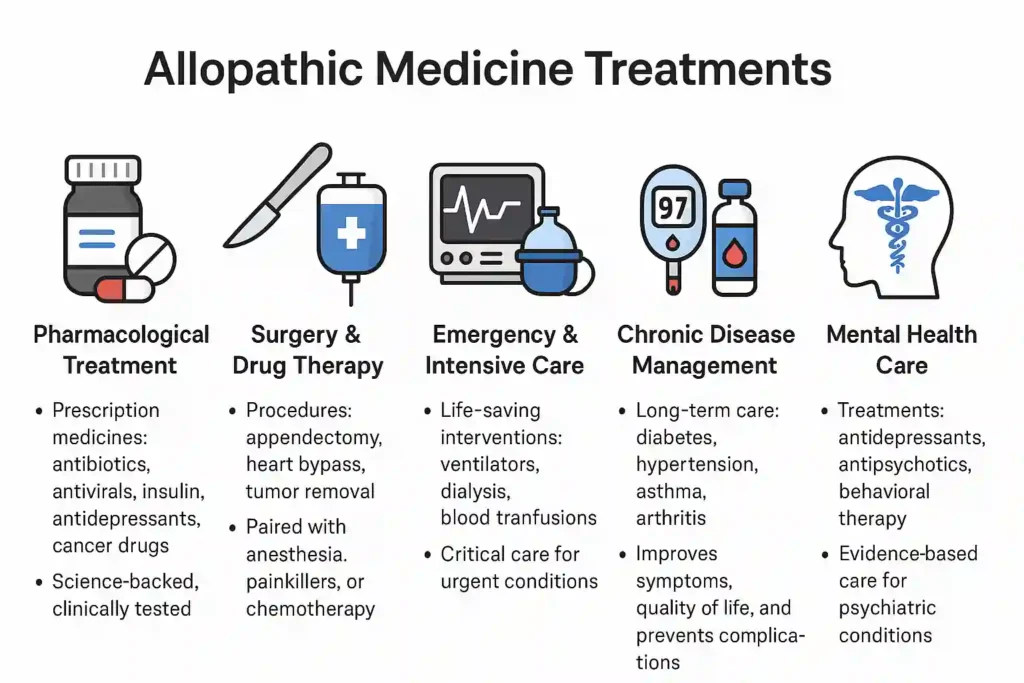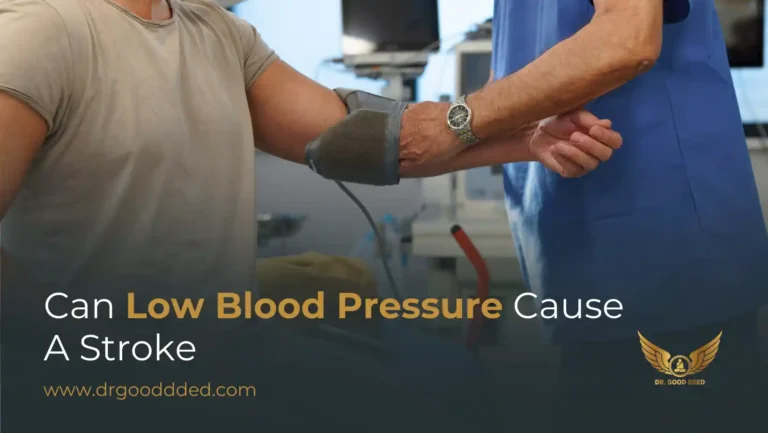Allopathic medicine is the most widely practiced medical system in the world today. If you’ve ever taken antibiotics for an infection, had surgery, or received a vaccine, you’ve experienced it firsthand.
But what is allopathic medicine exactly? Why is it called that? How is it different from other systems like homeopathy or osteopathy?
To understand the allopathic medicine definition, it’s important to look at its origins, treatments, preventive role, and comparisons with other healthcare systems.
Unlike other traditional systems, allopathy focuses on evidence-based medicine, science-backed research, and results that can be measured. This makes it the foundation of today’s healthcare system.
Origin of the Term
The word “allopathy” was introduced in the 1800s by Samuel Hahnemann, the founder of homeopathy. He used it to describe the methods used by conventional doctors; treatments that worked by producing effects opposite to the symptoms.
For instance, if someone had pain and inflammation, doctors prescribed anti-inflammatory drugs that countered the symptom. That is where the allopathy meaning originated.
Though the word was coined by critics, over time it became a general term for Western medicine. Today, medical schools across the globe train physicians in this system, making it the backbone of global clinical practice.
Allopathic Medicine Treatments

At its core, allopathic treatment is about using science-backed methods to diagnose and cure illness. It covers a vast range of medical interventions that vary from the simple to the highly complex.
1. Pharmacological treatment
This includes prescription medicines such as antibiotics, antivirals, insulin, antidepressants, and cancer drugs. These medicines are tested in labs and clinical trials before doctors prescribe them.
2. Surgery and drug therapy
Surgical approaches like appendectomy, heart bypass, or tumor removal save millions of lives each year. Surgery is often paired with medicines such as anesthesia, painkillers, or chemotherapy.
3. Emergency and intensive care
Ventilators, dialysis, and blood transfusions are part of primary healthcare and emergency care. These are lifesaving medical interventions applied in critical cases.
4. Chronic disease management
Conditions like diabetes, hypertension, asthma, and arthritis require long-term pharmacological treatment. This helps patients manage symptoms, improve quality of life, and prevent complications.
5. Mental health care
Allopathy also plays a key role in mental health. Antidepressants, antipsychotics, and behavioral therapy are backed by research and are vital in psychiatric clinical practice.
What makes allopathic medicine unique is that every treatment is tested, proven, and adjusted as new research comes in. This keeps it dynamic and reliable.
Preventive Care in Allopathic Medicine
One of the biggest myths is that allopathy only treats sickness. In reality, preventive care is one of its strongest pillars.
- Vaccination programs: From polio to COVID-19, vaccines have saved millions. They are the cornerstone of evidence-based medicine.
- Screenings: Mammograms, colonoscopies, and blood tests help detect disease early.
- Health counseling: Doctors provide diet, sleep, and fitness advice to prevent future illness.
- Lifestyle disease management: Guidance for avoiding diabetes, obesity, and hypertension.
Prevention shows how allopathy is not just about reacting to illness but also about keeping populations healthy. It is deeply tied to the healthcare system worldwide.
Allopathic vs. Osteopathic Medicine
Both allopathic vs osteopathic medicine produce licensed physicians. Yet, the difference between allopathic and osteopathic medicine lies in philosophy.
| Aspect | Allopathic Medicine (MDs) | Osteopathic Medicine (DOs) |
| Core Philosophy | Treats disease with drugs, surgery, and evidence-based medicine. | Uses the same methods but adds focus on the body’s self-healing ability. |
| Degree | MD (Doctor of Medicine) | DO (Doctor of Osteopathic Medicine) |
| Training Focus | Strong emphasis on technology, pharmacology, and specialized medical interventions. | Includes all MD training + extra hours in musculoskeletal system and manual therapy. |
| Clinical Practice | Diagnose, prescribe medications, perform surgery, and manage diseases. | Diagnose, prescribe, perform surgery, plus offer osteopathic manipulative treatment (OMT). |
| Global Recognition | Common worldwide; dominant in the healthcare system. | Recognized mainly in the U.S., growing internationally but less common globally. |
| Philosophy in Patient Care | Focus on symptoms and disease control. | Focus on whole-body health and preventive care along with standard treatments. |
| Difference between allopathic and osteopathic medicine | Evidence-driven, technology-heavy, widely practiced. | Similar methods, but with added holistic philosophy and hands-on therapy. |
In practice, MDs and DOs often work side by side in hospitals. Both prescribe medicines, perform surgeries, and provide full care. The difference is subtle but important.
Allopathic vs. Homeopathic Medicine
When comparing homeopathic vs allopathic medicine, the differences are much more striking.
| Aspect | Allopathic Medicine | Homeopathic Medicine |
| Definition | Mainstream, evidence-based medicine using drugs, surgery, and proven treatments. | Alternative system using diluted natural substances based on “like cures like.” |
| Origin of Term | From Greek allos (opposite) + pathos (suffering). | Founded by Samuel Hahnemann in late 18th century. |
| Core Principle | Treats disease by producing effects opposite to symptoms. | Belief that substances causing symptoms in large doses can cure them in tiny doses. |
| Treatment Style | Relies on pharmacological treatment, surgery and drug therapy, and modern medical interventions. | Uses diluted remedies, often plant- or mineral-based. |
| Scientific Basis | Strongly supported by evidence-based medicine and clinical trials. | Limited large-scale evidence; results often anecdotal. |
| Examples | Antibiotics for infections, insulin for diabetes, chemotherapy for cancer. | Diluted pollen for allergies, arnica for bruising, nux vomica for indigestion. |
| Place in Healthcare | Backbone of global healthcare system and primary healthcare. | Considered complementary/alternative; less emphasized in formal medical schools and allopathy training. |
| Strengths | Quick relief, reliable results, effective in emergencies and chronic care. | Seen as gentle, low-risk, holistic approach with fewer side effects. |
| Limitations | Possible drug side effects, high costs, resistance issues. | Lack of solid scientific backing, slow results, effectiveness debated. |
| Homeopathic vs Allopathic Medicine | Treats with proven, research-based solutions. | Uses natural remedies but lacks strong scientific support. |
The Takeaway
- Allopathic medicine is the foundation of modern healthcare, using drugs, surgery, and science-backed treatments.
- The term “allopathy” started as a critique but now represents the world’s main medical system.
- It focuses on both disease diagnosis and treatment and preventive care (like vaccines, screenings, and lifestyle advice).
- Its strength lies in evidence-based medicine, meaning every therapy is tested for safety and effectiveness.
- Allopathic treatment is vital in emergencies, chronic disease management, and modern primary healthcare.
- Compared with alternatives, it offers proven results but can also cause side effects, which doctors manage through careful monitoring.
- While not perfect, it remains the backbone of the global healthcare system, trusted for its reliability and scientific foundation.
The Bottom Line
Allopathic medicine is modern healthcare. It is what most of us experience when we visit hospitals or clinics. Rooted in evidence-based medicine, it focuses on treating disease, preventing illness, and saving lives through science.
From childhood vaccines to lifesaving surgeries, allopathy has transformed the world. The allopathic medicine definition is simple: treat diseases with methods proven to work.
FAQs
What is meant by allopathic medicine?
Allopathic medicine refers to the practice of treating illnesses with drugs, surgeries, and scientifically proven methods. It relies on evidence, clinical research, and measurable results to manage or cure disease.
Which is an example of allopathic treatment?
Taking antibiotics for a bacterial infection, receiving insulin for diabetes, undergoing heart surgery, or using chemotherapy for cancer are all clear examples of allopathic treatment practiced worldwide.
What is the difference between allopathy and homeopathy?
Allopathy treats with opposite effects, using drugs or surgery. Homeopathy uses diluted substances based on “like cures like.” Their approaches, training, and scientific foundations are entirely different from each other.
Is allopathy and English medicine the same?
Yes, in many countries “English medicine” is another term for allopathy. It refers to modern medicine, as opposed to Ayurveda, Siddha, or other traditional medical practices still followed regionally.
How safe is allopathic medicine?
Allopathy is safe when practiced by licensed doctors. However, medicines and surgeries can cause side effects. Doctors weigh risks, monitor patients, and adjust treatments for safety and effectiveness.
What are the examples of allopathic drugs?
Antibiotics like amoxicillin, antivirals, insulin injections, antidepressants, antihypertensives, chemotherapy drugs, and vaccines are all examples of drugs used in allopathic medicine for treatment and prevention.
Does allopathy have side effects?
Yes. Every medicine or surgery can have side effects. However, doctors carefully monitor patients, adjust dosage, and provide guidance to minimize risks while maximizing treatment benefits.











Leave a Comment